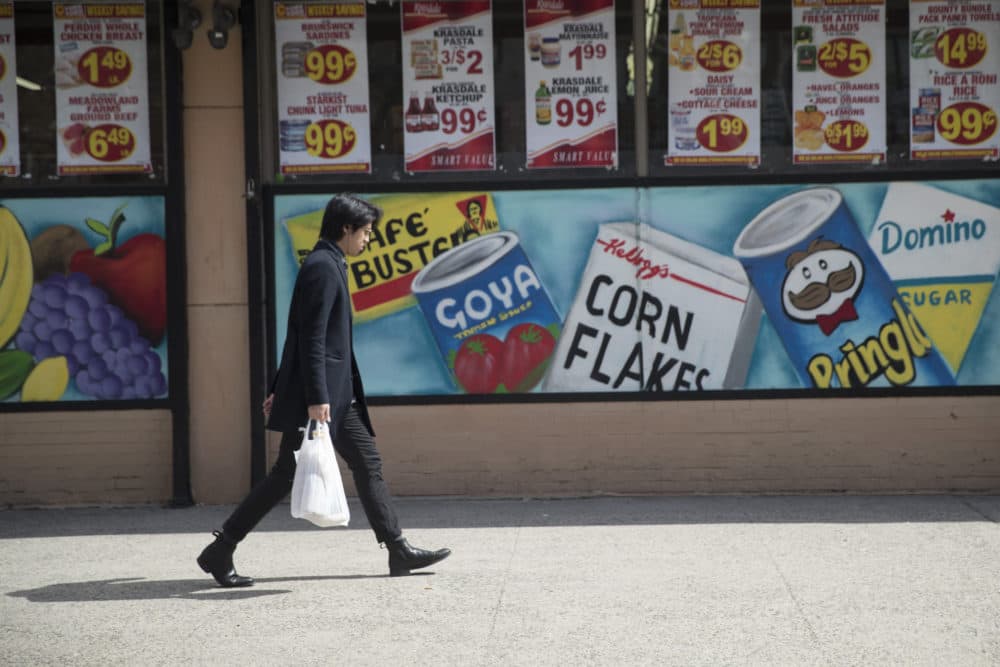Advertisement
As Legislators Once Again Mull Statewide Plastic Bag Ban, Some Retailers Carry Concerns

When it comes to getting rid of pesky plastic bags, Massachusetts state Rep. Lori Ehrlich hopes the sixth time's the charm.
Ehrlich is sponsoring a House bill (H.771) that would ban plastic bags statewide. Since 2009, Ehrlich has proposed such a bill each session, without success. But with state Sen. Jamie Eldridge sponsoring an identical bill in the Senate, and the recent stories of plastic-choked whales splashed across the media, she says this year feels different.
“I've seen attitudes change in recent years. When I first filed it, I heard a lot more grumbling than I hear now,” Ehrlich says. “People were thinking, ‘oh they're so convenient, they're so light.’ But then what I've also heard is once people start bringing their own reusable bags they never want to [go to] the store without them.”
Bags And Business
Retailers, however, are divided. One hundred and six communities in Massachusetts have some kind of plastic bag ban, but the regulations aren’t uniform. That “hodgepodge” of laws isn’t ideal for retailers and grocers, according to Brian Houghton, a spokesperson for the Massachusetts Food Association, a trade group representing retailers and grocers.
Houghton says the group supports a statewide ban, with some stipulations. The current bills call for an Aug. 1 start date. Houghton says this is too soon, so he's asking for changes that give grocers a grace period to use up existing products and order new ones. He agrees with the stipulation requiring customers to pay a 5-cent bag fee for paper bags.
“Fees are important because it cuts down on the use of paper and reusable bags that might be purchased,” Houghton says.
Christopher Carlozzi from the National Federation of Independent Business, opposes the bill, saying plastic bag bans disproportionately hurt small businesses.
“One of the things the state could do is encourage promotion in education of efforts regarding reduce, reuse, recycle programs for plastic bags,” Carlozzi said. “We'd like to see the state promote that a little more rather than enact a full-on ban.”
How Bad Are Plastic Bags, Anyway?
Single-use plastic bags are made of polyethylene, which comes from petroleum. On average, single-use plastic bags are only used for 20 minutes before being thrown out, according to researchers at the Boston University Institute for Sustainable Energy. (Some experts quote that average use time as being as low as 12 minutes.)
In Boston, the city's single-stream recycling program prevents bags from being recycled, says BU earth and environment professor Michael Walsh. So after consumers here — and in many other communities — use them, the bags often end up heading to landfills or incinerators.
“[Because of] the way the city treats its waste, plastic bags are effectively a fossil fuel,” Walsh says. “The fossil fuels that are used to make this plastic bag, and that are embodied in this plastic bag, are then burnt in these facilities and released into the atmosphere.”
Plastic bags can be recycled at certain places. There are local grocery and retail stores that collect single-use plastic bags. However, most don’t end up there. People often just throw them out, or they get blown away during recycling collection, says Joseph Greene, a chemical engineering professor at California State University, Chico.
“[People would] rather just throw it away and have it go away, but it doesn't go away. It's going to come back and hurt you,” says Greene, who has studied the lifespan of bags. “We're one of the world leaders in plastic bags, we do better than anybody. And so it is in our obligation to find a solution, a sustainable solution for plastic bag problems.”
Paper's Got Problems, Too
Unlike paper bags, plastic bags will never decompose. Plastic bags can last 1,000 years in a landfill, or end up in the ocean, floating around basically forever. But paper bags have their own problems. Paper bags have a worse carbon footprint than single-use or reusable plastic bags due to their production process, says Greene.
Heavy-duty, reusable plastic bags are generally better from a climate-change perspective, if they are made with recycled materials. But, says Greene, some reusable bags — especially cotton bags — present another issue: Bacteria from foods can seep into the material.
Greene adds that the most effective way to handle plastic bag waste is to set up more in-store recycling centers, and change over to recycled and reusable plastic bags, rather than paper.
Bag-Less And Buying Less
Any policy decision related to sustainability will have trade offs, says BU's Walsh: Paper bags aren’t the solution, but plastic bags aren’t ideal, either. But plastic bag bans may be best for encouraging people to consume less overall.
“Change is not going to happen overnight,” Walsh says. “The hope is with the plastic bag ban … you incentivize less consumption of any type of bags all around."
State Rep. Ehrlich is hopeful, but says even if the bill doesn’t get passed this legislative session, she’s not giving up.
“I've managed to persist through this process but I hope I don't have to persist as long as a plastic bag in the environment. It's time for us to step up and do this. Our local communities have told us this should be a priority, and they've all managed to prove that it can be done.”